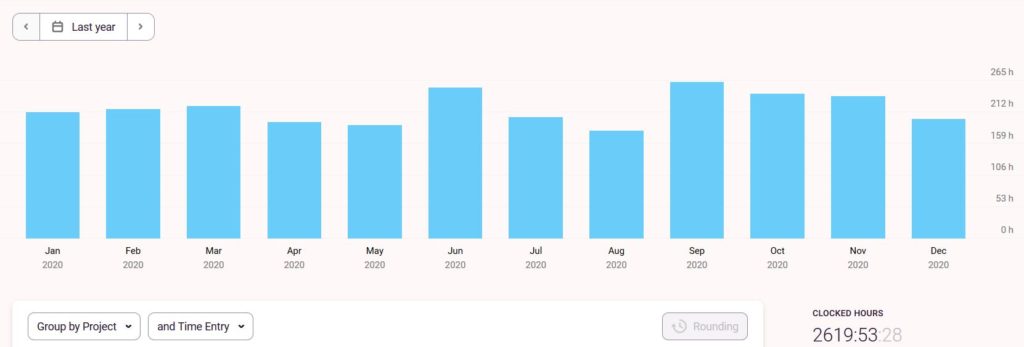
How I spent my time in 2020 at work
As some long-term readers of this blog know, I track my work time. I’ve been tracking my time at work (and sometimes, all my time) since I was a PhD candidate.
Here’s what my overall time looked like in 2020:

And a chart with breakdown by categories:

I spent my time as follows:
- Teaching: 484 hours
- Papers: 334 hours
- Teaching TU Delft: 261 hours
- Service: 256 hours
- Email: 234 hours
- Planning: 183 hours
- PhD Candidate 1: 172 hours
- ACI Avances: 106 hours
- Blog: 80 hours
- Research Project 1: 71 hours
- Book: 60 hours
- Meetings: 57 hours
- PhD Student 2: 55 hours
- Learning: 52 hours
- Research Project 2: 51 hours
- Proposals: 39 hours
- PhD Candidate 3: 30 hours
- TU Meetings: 30 hours
- PhD Candidate 4: 25 hours
- Collaboration Grant: 8 hours
- and then a number of smaller categories of less than 8 hours each
Looking back on my time logs from work in 2020, and comparing to 2019, I can observe the following:
- I’ve spent much much more time on teaching this year: I’ve been teaching more courses, taking courses about teaching online, and changing the format of my courses to online formats.
- A full-time position should demand 1760 hours. I’ve overworked by 48%. And I feel that I’ve done too much and need to take it a step down to preserve and protect myself.
- The amount of time I spent on service is slightly lower, but not by much. I’ve shifted from reviewing articles to more editorial and committee work this year, as I had to reject many review invitations.
- There’s no seasonality in my data. While I’ve taken leave for (in total) 5 weeks, I actually never had a week in which I didn’t work. My Rescue Time data shows that I worked on my computer for 361 days in 2020.
- There’s less rhythm to my days as well, as I’ve been fitting work around life, virtual school for my daughter, and other demands. I appreciate the flexibility of my work, but on the other hand, I feel I have never been “off” this year.
- I’ve spent more time on papers than last year (334 versus 203 hours), but I’ve published less. A possible explanation for this is that some papers just were harder to pull together, required more iterations of rewriting, many papers are still in the pipeline and in draft form, and my overall concentration was not as good.
- I’ve spent less time actively doing research and more time supervising research.
- Last year, I mused I hadn’t spent enough time with my PhD students – and I’ve put in much more effort this year.
Share with your peers!



